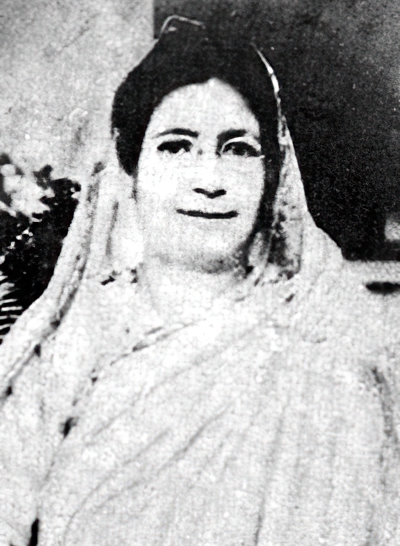Begum Rokeya
 Rokeya Sakhawat Hossain") is the commonly used spelling of Rokeya's full married name, Rokeya herself is never seen to use her full married name in this English spelling. In much of her correspondence in English, she used just her initials: ‘R. S. Hossein' (also used on the cover of the 1st edition of ''Sultana's Dream''). In some other correspondences in English, she used "Rokeya Khatun," or "Khatoon". In most of her correspondence in Bengali, she used just her first name "" (would be "Rokeya" if romanized).}} (9 December 1880}} – 9 December 1932), commonly known as Begum Rokeya, was a prominent Bengali feminist thinker, writer, educator and political activist from British India. She is widely regarded as a pioneer of women's liberation in Bangladesh and India.
Rokeya Sakhawat Hossain") is the commonly used spelling of Rokeya's full married name, Rokeya herself is never seen to use her full married name in this English spelling. In much of her correspondence in English, she used just her initials: ‘R. S. Hossein' (also used on the cover of the 1st edition of ''Sultana's Dream''). In some other correspondences in English, she used "Rokeya Khatun," or "Khatoon". In most of her correspondence in Bengali, she used just her first name "" (would be "Rokeya" if romanized).}} (9 December 1880}} – 9 December 1932), commonly known as Begum Rokeya, was a prominent Bengali feminist thinker, writer, educator and political activist from British India. She is widely regarded as a pioneer of women's liberation in Bangladesh and India.She advocated for men and women to be treated equally as rational beings, noting that the lack of education for women was responsible for their inferior economic position. Her major works include ''Matichur'' (A String of Sweet Pearls, 1904 and 1922), a collection of essays in two volumes expressing her feminist thoughts; ''Sultana's Dream'' (1908), a feminist science fiction novella set in Ladyland ruled by women; ''Padmarag'' ("Essence of the Lotus", 1924) depicting the difficulties faced by Bengali wives; and ''Abarodhbasini'' (The Confined Women, 1931), a spirited attack on the extreme forms of purdah that endangered women's lives and self-image.
Rokeya held education to be the central precondition of women's liberation, establishing the first school aimed primarily at Muslim girls in Kolkata. She is said to have gone from house to house persuading the parents to send their girls to her school in Nisha. Until her death, she ran the school despite facing hostile criticism and social obstacles.
In 1916, she founded the Muslim Women's Association, an organization that fought for women's education and employment. In 1926, Rokeya presided over the Bengal Women's Education Conference convened in Kolkata, the first significant attempt to bring women together in support of women's education rights. She was engaged in debates and conferences regarding the advancement of women until her death on 9 December 1932, shortly after presiding over a session during the Indian Women's Conference.
Bangladesh observes Rokeya Day on 9 December every year to commemorate her works and legacy. On that day, Bangladesh government also confers Begum Rokeya Padak on individual women for their exceptional achievement. In 2004, Rokeya was ranked number 6 in BBC's poll of the Greatest Bengali of all time. Provided by Wikipedia
-
1